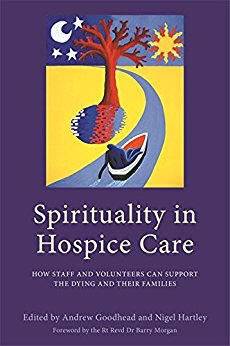Book Review
Spirituality in Hospice Care:
How Staff and volunteers can
support the dying and their families
Edited by Andrew Goodhead and Nigel Hartley
Jessica Kingsley
Publishers (14 Dec 2017)
ISBN: 978-1785921025
 What
motivates people to offer spiritual care to the dying? The answers to be
found in this very helpful work come from various different disciplines
including social work, nursing, medicine, chaplaincy work and
physiotherapy. The different perspectives form a coherent whole.
What
motivates people to offer spiritual care to the dying? The answers to be
found in this very helpful work come from various different disciplines
including social work, nursing, medicine, chaplaincy work and
physiotherapy. The different perspectives form a coherent whole.
It is argued that the hospice movement's good death philosophy along with a tradition of what it means to be a good nurse create a strong value system for nurses working in palliative care. In reality, the work can be exhausting and burdensome. Professionals too need support in this challenging but rewarding field of work. They are not angels but ordinary people in often extraordinary situations. At appropriate times, it is more important for professionals to "be" rather than to do. Listening and accompanying becomes the most important task.
Cicely Saunders coined the term "total pain" over fifty years ago. Pain is physical but it is also emotional and spiritual. All these different kinds of pain need to be examined if we are to offer holistic care. For Saunders, spirituality meant religion. Things are different now. Many people say that they are spiritual but not religious. They don't go to church. But they still value spiritual assistance. A large number of people are spiritually uncertain. There are relatively few committed atheists.
Even the atheist community is divided on spirituality. Some are hostile to the very idea. Others believe in a spirituality that is related to but independent of religion. In this work, it is argued that religion and spirituality have a lot in common. The word religion means to bind fast. Certainly, we are bound fast by our common beliefs. But we are also bound fast to our fellow man. It is said that contemplatives are bound more strongly to humanity than others.
The chapter written by a chaplain beautifully notes that for Christians, God is a crucified God whose power is found in the depths of weakness and suffering. God is there with the one who suffers. We need to show this face of God to the atheist who asks where God is in the midst of human suffering.
This is a work that has made me reflect. As such, I found it very helpful. I found myself agreeing with some contributors more than others and that is hardly surprising.
Reviewed by Pravin Thevathasan
